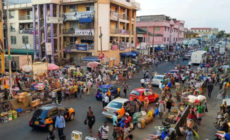We need jobs – Oil City demands
- Posted on
- Comment
 Residents of Ghana’s rich oil cities have asked the country’s politicians to spend the oil money more responsibly and provide jobs for them.
Residents of Ghana’s rich oil cities have asked the country’s politicians to spend the oil money more responsibly and provide jobs for them.
With two months to the elections this year, pressure is mounting on political parties seeking the mandate of Ghanaians to be in government to commit to providing jobs for local people in the country’s oil rich towns.
Interviews conducted by this paper revealed total despondency on the part of residents of Sekondi-Takoradi in Ghana’s Western region over joblessness amidst rising cost of living in the twin cities.
“I have not seen any benefits of the oil industry to me because we were here before the oil came. Life has become rather unbearable since oil drilling commenced here; the standard of living here is now too high,” one resident said.
According to the residents, the oil city tag on Sekondi-Takoradi had brought untold hardships than benefits to them.
“We cannot even rent rooms, prices of everything have gone through the roof; majority of the workers in the oil companies are losing their jobs,” a resident said.
Recently, some residents of Saltpond in Ghana’s Central region demanded their share of proceeds from the Saltpond Offshore Crude Oil Producing Company.
They accused successive governments of depriving them of the basic necessities due them, despite the revenue accrued from the oil company.
Some communities in the country in recent times have threatened not to vote in the upcoming general election; if the necessary development projects are not implemented.
President of the Saltpond Forum, Dr Ransford Gyampo, asked government to provide them with updates on the revenues from the company or risk losing their vote.
“We call on government and indeed all presidential hopefuls to immediately turn their attention to Ghana’s political Mecca. We have been abandoned for far too long and today we are prepared to mobilise the good people of Saltpond to boycott the upcoming general elections in protest against their marginalization, if we do not see any sign of concern from the ruling government and the opposition,” he added.
Fisherfolk along the coast of the oil rich Western region say they are facing challenges with employment.
They are lamenting leakages in the pipes on the sea bed that carry gas from the Jubilee field to the gas plant at Atuabo.
According to them, apart from the fact that the leaked gas is killing the fish, light used on the oil rig attracts all the fish depriving the fishermen of their livelihoods.
One of the major concerns of experts has been that the local people in oil rich communities lack the skills and certification required for the industry.
Beyond that, investment into capacity building for the sector has been on the decline. Oil money has been spent on other areas not directly linked to the sector.
According to the Public Interest and Accountability Committee (PIAC), Cumulatively, only 3.25 per cent (GH¢8.93million) of the GH¢274.94million allocated from the Annual Budget Funding Amount (ABFA) to capacity building from 2011 to 2015 was used to directly build capacity in the oil and gas sector.
This means that GH¢266million has since 2011 been spent supposedly on building capacity in sectors other than the oil and gas sector.
The opposition New Patriotic Party (NPP) has proposed the establishment of a petro-chemical industry in Sekondi.
The intention, according to the party is to provide alternative employment avenues for the local people whose jobs have been compromised by oil activities on the seas.
The ruling National Democratic Congress (NDC) is committing to creating opportunities that will progressively increase local participation in the mainstream operations of the sector.
By Isaac Aidoo










 (Selorm) |
(Selorm) |  (Nana Kwesi)
(Nana Kwesi)